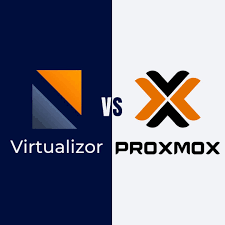Choosing between Virtualizor or Proxmox isn’t just a question of which is “better,” but rather which tool best suits your needs . They’re fundamentally different: one is a full-featured virtualization platform, and the other is a control panel focused on VPS sales and management.
In short:
- Proxmox VE (Virtual Environment) is a complete operating system (based on Debian Linux) that functions as a hypervisor. It allows you to create and manage Virtual Machines (VMs) and Containers (LXC) and includes advanced clustering, high availability, and storage features. It is an infrastructure solution.
- Virtualizor is a commercial control panel (software that installs on top of an operating system) designed to simplify the creation, management, and sale of VPSs. It supports several hypervisors, including KVM, Xen, OpenVZ, and even Proxmox. Its focus is on automation and the hosting business.
Let’s break down the comparison to help you make your choice.
### Comparison Table: Proxmox or Virtualizor
| Feature | Proxmox VE | Virtualizer |
| Product Type | Complete Virtualization Platform (Hypervisor) | Control panel for VPS management |
| Cost | Free and Open Source. Optional paid support. | Paid. Monthly/annual license per server. |
| Ease of Use | Steeper learning curve. Powerful interface for system administrators. | Very easy to use. Intuitive interface for both admin and end user. |
| Target Audience | System administrators, enthusiasts (homelabs), companies for internal infrastructure. | Hosting providers (VPS Hosting), resellers and companies that need sales automation. |
| Virtualization | KVM (for VMs) and LXC (for Containers). | Supports multiple hypervisors: KVM, Xen, OpenVZ, LXC and can manage a Proxmox node. |
| Native Resources | ✅ Clustering, High Availability (HA), Live Migration, Integrated Backup, Firewall, Ceph Storage, Software Defined Networking (SDN). | ❌ Most of these features depend on the underlying hypervisor. It offers its own clustering for centralized management. |
| Integration | Robust API for custom automation. | ✅ Native integration with billing systems (WHMCS, Blesta), which is its great differentiator. |
| Management | Centralized management of multiple servers (nodes) through native clustering. | Manage multiple servers from one master panel. |
| Support | Community support (forum) and paid enterprise support. | Direct support included in the license. |
### Detailed Analysis
#### Proxmox VE 🏆
Proxmox is a robust and extremely powerful all-in-one solution for server virtualization. Think of it as an open-source alternative to solutions like VMware vSphere or Microsoft Hyper-V.
Advantages of Proxmox:
- Unbeatable Value for Money: Being free, it allows you to build an enterprise-grade infrastructure without licensing costs.
- Advanced Native Features: The ability to create a high-availability cluster, migrate VMs without downtime (live migration), and manage complex storage (such as Ceph) in an integrated way is a huge differentiator.
- Efficiency with Containers (LXC): In addition to full VMs (KVM), LXC container support allows you to run isolated Linux environments with much less resource consumption.
- Strong Community: It has an active community and extensive documentation, making it easier to resolve issues.
When to choose Proxmox?
- You are building the virtualization infrastructure for your own company.
- You need advanced features like high availability and live migration.
- Cost is a deciding factor and you have the technical knowledge to manage the environment.
- You want to consolidate multiple physical servers into one or more virtual hosts.
- You are setting up a home lab.
#### Virtualizor 🚀
Virtualizor isn’t a hypervisor, but rather a management layer that sits on top of one. Its main goal is to make life easier for those who sell VPS services.
Advantages of Virtualizor:
- Focus on Sales Automation: Its seamless integration with WHMCS and other billing systems is its greatest asset. It automates the creation, suspension, and cancellation of VPSs based on customer payments.
- Customer-Friendly Interface: The end-user panel is simple and allows the customer to reboot, reinstall the operating system, and view statistics of their VPS without needing help.
- Hypervisor Flexibility: You’re not tied to a single virtualization technology; you can choose the one that best suits your needs.
- Commercial Support: Having dedicated support included in the license is a huge advantage for businesses that can’t afford to stop.
When to choose Virtualizor?
- You are a hosting provider and want to sell VPS servers.
- Automating billing and provisioning is your top priority.
- You need a very simple web interface for your end customers to manage their own virtual machines.
- You manage multiple servers for different clients and need a centralized dashboard focused on this task.
### Conclusion: What is the best option for you?
The answer depends on your project:
- For Internal Infrastructure and Full Control: Proxmox is the superior choice. It offers more power, flexibility, and enterprise-grade features for free. You’ll have complete control over your virtualization infrastructure.
- For Selling and Managing VPS (Hosting): Virtualizor is the right tool for the job. It was built for this. Automation with billing systems and a user-friendly interface for the end customer will save time and make managing your hosting business easier.
It’s important to note that these two approaches aren’t mutually exclusive . You can install Virtualizor on a server already running Proxmox to take advantage of Proxmox’s capabilities (such as Ceph storage) while also using the Virtualizor interface to manage VM deployments on that node. However, in most cases, the choice will be one or the other depending on your project’s focus.
